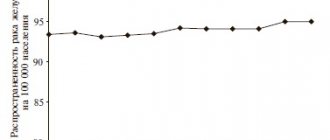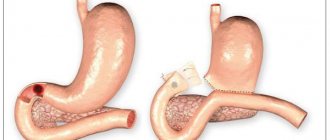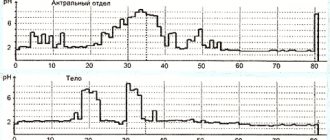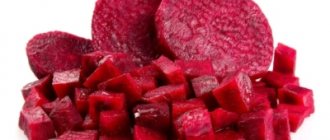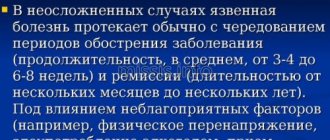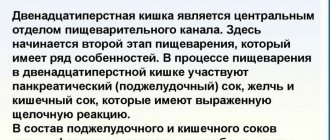Complications of gastric and duodenal ulcers
Surgeon A.I. Zalivskaya. Surgical department No. 1
Peptic ulcer disease is a chronic, recurrent disease prone to progression, involving in the pathological process, along with the stomach and duodenum (in which ulcerative defects of the mucous membrane are formed during periods of exacerbation), other organs of the digestive system, the development of complications that threaten the patient’s life. Peptic ulcer disease occurs in people of any age, but more often at the age of 30-40 years, it affects about 5% of the adult population. The urban population suffers from peptic ulcers more often than the rural population; men are affected 6-7 times more often than women.
Complications of gastric and duodenal ulcers include bleeding , perforation , penetration , pyloric stenosis and malignancy .
BLEEDING. This is one of the most common and dangerous complications of peptic ulcer disease, it occurs in 15-20% of patients and is the cause of almost half of all deaths in this disease. It is observed mainly in young men. Small bleedings are more common, massive ones are less common. Sometimes sudden massive bleeding is the first manifestation of the disease. It is important to note that ulcer bleeding can occur both in the presence of a severe, deep, advanced ulcer, and in a fresh, small ulcer. The main symptoms of ulcer bleeding are black stools and coffee-ground-colored vomit (or vomiting blood). Black stool is characteristic of bleeding from a duodenal ulcer, and bloody vomiting is characteristic of a gastric ulcer. Additional symptoms of this complication are general weakness, dry mouth, nausea, mild chills, dizziness, nausea, and increasing weakness. The skin turns pale, cold sweat appears, and the heartbeat quickens.
If symptoms of bleeding appear, you should immediately call an ambulance. While waiting for the doctor, the patient should be laid down and a cold compress (preferably ice) applied to the stomach. You should not take any medications, drink or eat on your own. It should be noted that gastric bleeding can have very different degrees of severity (and, accordingly, different consequences). So, there are also mild stomach bleedings that can stop on their own. However, unfortunately, gastric bleeding can be (although extremely rare) so severe that within a few minutes (!) after the onset it can lead to the death of the patient.
PERFORMANCE OF ULCERS. It is also one of the most severe and dangerous complications. Occurs in 5-10% of cases. During exacerbations, a patient with peptic ulcer disease should be very attentive to his health. Since during this period there is a risk of such a life-threatening complication as perforation, or perforation, of an ulcer, that is, the formation of a through wound in the wall of the stomach (or duodenum), through which undigested food, along with acidic gastric juice, enters the abdominal cavity. Often, perforation of an ulcer occurs as a result of drinking alcohol, overfilling the stomach with food, or excessive physical stress. There are cases when perforation of an ulcer becomes the first manifestation of a peptic ulcer. This happens more often with young people. The main sign of perforation of an ulcer is acute “dagger” pain in the abdomen, caused by food entering the abdominal cavity. The patient takes a forced position with his knees pulled up to his stomach and tries not to move. Sometimes the pain is so severe that people lose consciousness. 12-48 hours after perforation, peritonitis develops, which in the absence of immediate medical care can be fatal. (Food spilled throughout the abdominal cavity rots, and bacteria multiply in it at a catastrophic rate.) Death from peritonitis occurs on the 3rd-4th day.
Symptoms of perforation of an ulcer, when they appear, you should immediately call an ambulance, are as follows: short-term sharp pain, which gradually subsides (within several hours), while the patient’s body temperature rises, blood pressure drops, the abdomen is tense and very sensitive to touch . The heartbeat quickens, cold sticky sweat appears, the skin turns pale, the extremities become cold, thirst and dry mouth appear. Sometimes (very rarely) vomiting is observed.
PENETRATION . This is the same as perforation of an ulcer, that is, a violation of the integrity of the stomach, only penetration is spoken of when gastric contents spill not into the abdominal cavity, but into the nearby pancreas, omentum, intestinal loops or other organs. In this case, the pain becomes almost constant, very intense, loses its natural connection with food intake, and does not decrease from taking antacids. Nausea, vomiting, and temperature increase. Soon signs of damage to the organ into which penetration occurred (girdling pain and vomiting when the pancreas is damaged, pain in the right hypochondrium with irradiation to the right shoulder and back when penetration into the liver, etc.)
Cicatricial pyloric stenosis. Pyloric stenosis is an anatomical distortion and narrowing of the sphincter lumen that occurs as a result of scarring of an ulcer of the pyloric canal or the initial part of the duodenum. This phenomenon leads to difficulty or complete cessation of the evacuation (passage) of food from the stomach to the duodenum.
This complication develops gradually. Symptoms depend on the degree of narrowing. In the compensation phase, if the degree of narrowing is insignificant, its symptoms are a feeling of heaviness, fullness in the stomach, especially after eating a large meal, sour belching, nausea, vomiting, which brings relief. In the subcompensation phase, there is increased pain, increased vomiting, and the vomit often contains remnants of food taken the day before. During the decompensation phase, when there is constant retention of food in the stomach, there is a putrid smell from the mouth and a feeling of “splashing” in the stomach. All this leads to severe disorders of all types of metabolism (fats, proteins, carbohydrates, salts), which, in turn, leads to exhaustion of the body, weight loss, and dehydration.
MALIGNIZATION (degeneration into cancer) . Cancerous degeneration is observed when the ulcer is localized in the stomach, more often in older people. This complication occurs in at least 5−10% of cases. Malignancy of duodenal ulcers is extremely rare. Signs of cancerous degeneration of an ulcer are a change in the nature of the pain, which loses its frequency, connection with food, becomes constant, and a deterioration in the general condition of the patient - weight loss, weakness, loss of appetite, nausea, vomiting, low-grade fever, anemia. Often, one of the initially manifesting symptoms of cancer against the background of a stomach ulcer is a change in the perception of taste or smell; in addition, an aversion to certain foods (usually meat products) may also develop.
The main signs of the disease: how to understand that it is an ulcer
An ulcer is a chronic disease. People whose relatives, even distant ones, once suffered from diseases associated with this organ are at greater risk. It is important to know the signs that help a sick person see the need to see a doctor.
Firstly, the disease manifests itself in different ways. For example, the first patient feels severe pain in the abdominal area, but for the second, such sensations will be a subtle hindrance. Secondly, you need to understand the essence of the disease. An ulcer forms when the body cannot cope with the mucus produced by an organ. There is a conflict between the protective mechanism of the stomach and aggressive factors.
Thirdly, such a development of the disease leads to severe pain, loss of appetite, and general weakness, which affects the person’s condition. How dangerous are the listed signs? Is it possible to die from a stomach ulcer?
Doctors' opinion: why is a stomach ulcer dangerous?
The disease is treatable. However, a person must listen to body language and understand that a stomach ulcer has begun to develop.
Unfortunately, doctors have to admit: every fifth patient cannot cope with the disease and dies. It is better for people at risk to become more familiar with the complications that lead to death.
Bleeding
An ulcer should not cause serious concern for a person - the disease is terrible, but you can live with it. Sometimes blood begins to flow from a wound on the wall of the stomach. A person is faced with the presence of internal bleeding, signaling an impending danger.
Bleeding often occurs with ulcers
This happens when there is no or very delayed treatment. The ulcer gradually deepens, reaching a blood vessel, which subsequently corrodes. The vascular network in the stomach is highly developed, patients think that bleeding with a peptic ulcer is a normal, harmless phenomenon. Such people are primarily at risk of dying from the disease described; the situation will gradually become more complicated, the body will weaken, and treatment will continue to be absent.
If a person closely monitors the development of the disease, it is important to know the symptoms of bleeding:
- dizziness;
- increased sweating (cold);
- drowsiness;
- frequent increase in heart rate.
The symptoms described may indicate other complications that can lead to death. It is worth carefully monitoring the body's signals. With severe bleeding, a person can lose several liters of blood in twenty minutes.
Perforation
Perforation becomes a terrible and unpleasant complication. Let's try to imagine the stomach in the form of a bag. It contains food remains, impurities and gastric juice. When perforation occurs, the walls of the organ undergo gradual erosion, leading to the formation of real holes.
The contents of the stomach fall into the formed pits and flow into the abdominal cavity. What is happening brings unbearable pain, the person lies in bed and does not get up for a long period of time.
A similar process occurs suddenly. Moreover, the bleeding described in the article becomes a harbinger of perforation. Already when the first complication appears, a person suffering from a stomach ulcer should consult a doctor.
Symptoms of complications are:
- sharp pain in the abdominal area;
- constant discomfort in the navel area;
- tense abdominal muscles.
If a perforation has already occurred, only doctors can help. More patients die from the described complication.
Penetration
Penetration refers to the fusion of several organs - the ulcerative walls of the stomach “stick” to neighboring organs. The intestines and pancreas are at risk.
A dangerous complication is that the walls of neighboring organs begin to be affected by ulcers, gradually leading to cancer. The consequences are especially dire if the soldering occurs in the pancreas. This organ is extremely sensitive to injury, and the disease is more likely to develop cancer.
After the walls of the stomach fuse with the pancreas, the patient may develop pancreatitis within a few hours, which is recognized by doctors as an extremely dangerous outcome of peptic ulcer disease.
Pyloric stenosis
To understand this complication, we will give a brief medical lecture. The pylorus is the tiny final section of the stomach through which food undigested for various reasons passes into the duodenum. Accordingly, with stenosis, deformation occurs; the area gradually turns into a hard process that impedes the movement of food.
Complications can appear after several years of persistent fight against the disease. The patient may constantly feel sick, and as stenosis develops, he may vomit. Later, sour and unpleasant uncontrollable belching appears.
Unfortunately, if the problem with the condition of the pylorus is not solved, communication between the organs stops, causing complications of a pronounced nature.
Stomach cancer
Cancer becomes a dangerous complication of peptic ulcer disease. In the absence of constant medical supervision, the walls of the stomach gradually “give in” to the disease, and things take a critical turn.
Doctors say it is possible to live with stomach cancer. But any movement, incorrectly taken food, or untimely medication ends with a natural outcome: the patient will suffer from unbearable pain for several hours.
Doctors can notice stomach cancer and ulcers after carefully examining the patient. There is only one way out - go to a specialized clinic.

